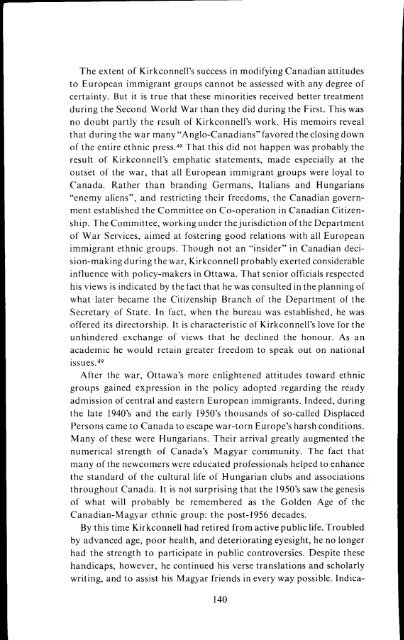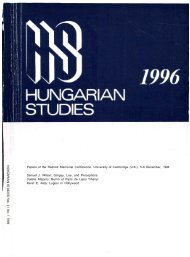The Canadian-American Review of Hungarian Studies - Vol. 4 ... - EPA
The Canadian-American Review of Hungarian Studies - Vol. 4 ... - EPA
The Canadian-American Review of Hungarian Studies - Vol. 4 ... - EPA
You also want an ePaper? Increase the reach of your titles
YUMPU automatically turns print PDFs into web optimized ePapers that Google loves.
<strong>The</strong> extent <strong>of</strong> Kirkconnell's success in modifying <strong>Canadian</strong> attitudesto European immigrant groups cannot be assessed with any degree <strong>of</strong>certainty. But it is true that these minorities received better treatmentduring the Second World War than they did during the First. This wasno doubt partly the result <strong>of</strong> Kirkconnell's work. His memoirs revealthat during the war many "Anglo-<strong>Canadian</strong>s" favored theclosing down<strong>of</strong> the entire ethnic press. 48 That this did not happen was probably theresult <strong>of</strong> Kirkconnell's emphatic statements, made especially at theoutset <strong>of</strong> the war, that all European immigrant groups were loyal toCanada. Rather than branding Germans, Italians and <strong>Hungarian</strong>s"enemy aliens", and restricting their freedoms, the <strong>Canadian</strong> governmentestablished the Committee on Co-operation in <strong>Canadian</strong> Citizenship.<strong>The</strong> Committee, working under the jurisdiction <strong>of</strong> the Department<strong>of</strong> War Services, aimed at fostering good relations with all Europeanimmigrant ethnic groups. Though not an "insider" in <strong>Canadian</strong> decision-makingduring the war, Kirkconnell probably exerted considerableinfluence with policy-makers in Ottawa. That senior <strong>of</strong>ficials respectedhis views is indicated by the fact that he was consulted in the planning <strong>of</strong>what later became the Citizenship Branch <strong>of</strong> the Department <strong>of</strong> theSecretary <strong>of</strong> State. In fact, when the bureau was established, he was<strong>of</strong>fered its directorship. It is characteristic <strong>of</strong> Kirkconnell's love for theunhindered exchange <strong>of</strong> views that he declined the honour. As anacademic he would retain greater freedom to speak out on nationalissues. 49After the war, Ottawa's more enlightened attitudes toward ethnicgroups gained expression in the policy adopted regarding the readyadmission <strong>of</strong> central and eastern European immigrants. Indeed, duringthe late 1940's and the early I950's thousands <strong>of</strong> so-called DisplacedPersons came to Canada to escape war-torn Europe's harsh conditions.Many <strong>of</strong> these were <strong>Hungarian</strong>s. <strong>The</strong>ir arrival greatly augmented thenumerical strength <strong>of</strong> Canada's Magyar community. <strong>The</strong> fact thatmany <strong>of</strong> the newcomers were educated pr<strong>of</strong>essionals helped to enhancethe standard <strong>of</strong> the cultural life <strong>of</strong> <strong>Hungarian</strong> clubs and associationsthroughout Canada. It is not surprising that the 1950's saw the genesis<strong>of</strong> what will probably be remembered as the Golden Age <strong>of</strong> the<strong>Canadian</strong>-Magyar ethnic group: the post-1956 decades.By this time Kirkconnell had retired from active public life. Troubledby advanced age, poor health, and deteriorating eyesight, he no longerhad the strength to participate in public controversies. Despite thesehandicaps, however, he continued his verse translations and scholarlywriting, and to assist his Magyar friends in every way possible. Indica-
















